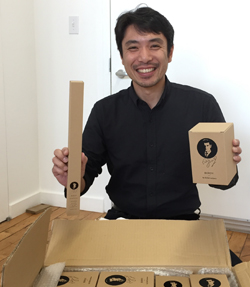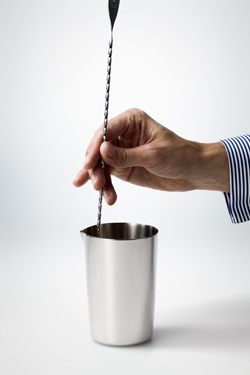Atsushi Semimoto
 - interview by Sara Gorelick
- interview by Sara Gorelick
It is a known fact that Japanese artisans are skilled and meticulous, and that mindset also extends to bartending. Japanese bartenders are recognized for their dedication to the craft and the precise work they put into each cocktail. We sat down with Atsushi Semimoto, president of Santoku NYC, whose company specializes in introducing Japanese skills and products to the world. One of the brands he has brought to the US market is the Birdy line of products by world-renowned bartender Erik Lorincz, who was the head bartender of the Savoy American Bar in the UK. Eric joined Birdy in 2014 to design and develop Birdy barware with a man named Tetsuya Yokoyama. Together in Japan, they created the unprecedented bar tools that are appreciated by top bar men and women around the world.
Currently Atshusi is the only official dealer of Birdy in the United States.
SG: What makes these bar tools so special?
AS: Birdy has a new and innovative design that makes cocktails mild and smooth. Their shaker has been spreading throughout Japan and the rest of the world. The shaker has a special round body shape, similar to a rugby ball, that enhances smooth mixing inside the shaker. The shape also works to prevent ice melt (less melt compared to a conventional shaker) and I believe makes cocktails taste better. The inside of the shaker is polished within a 0.1 micron level (many other shakers are polished to a 10 micron level). The polishing process is done by incredibly skilled craftsmen. The polishing is done vertically for the shaker, horizontally for the mixing tin. This means that it is the same direction of the actual flow of the liquid.
SG: Birdy has some beautiful designs throughout the range. Can you tell us more about them?

AS: The bar spoon 40 cm is great for professional bartenders. It has a bold and stylish look, and is well balanced and functional. Birdy's mixing tin is unique. Normally a mixing "glass" is used for stirring cocktails, but Birdy offers a metal tin instead. Compared to a conventional mixing glass, it chills faster, blends better and increases aeration. And of course, it will not break like glass does!
SG: What is the best thing about working with these products?
AS: To be a part of the best Japanese craftsmanship.
SG: Where are the products made?
AS: The Birdy line is made in Toyoda. The manufacturer, Yokoyama, has been making precise automotive parts for Toyota. They are located quite near to the Toyota head factory. The brothers of Yokoyama stepped into the new industry using their shaping and polishing metal technology.
SG: Are any bartenders of note working with these products?
AS: Shingo Gokan loves these products. I know his colleague Nana Shimosegawa, who is at Angel's Share. She asked me to import the line, and now I am the only one in the US who is dealing with Birdy. In Japan, Yukiyo Kuihara from the Mandari Bar at the Mandarin Oriental Tokyo is using them.
SG: Should we be expecting other tools form the Birdy line in the US?
AS: Yes, we are going to be introducing a strainer and the Birdy-developed jigger.
SG: What are the price ranges for the line?
AS: It goes from $49 to $123.50. But when you consider the amount of work going into each product, between the design, polishing and craftsmanship, it's really worth it.
SG: What other unique products do you offer at Santoku NYC other than Birdy?
AS: The M-Taka glass line is all hand-crafted in Tokyo. These are hand-blown, seamless glasses that are truly beautiful and functional. The M-Taka Diamond cut mixing glass has a design which looks like a fence or diamond crosses. Originally it was described as a fence pattern made by bamboo, which was commonly seen in ancient castles, forts or sometimes battlefields. It turned into a design name and was introduced by Kirko Japanese Glass, one of the famous Edo craft companies. There is a lot of tradition there; cutting the decoration of the glass into this specific pattern.